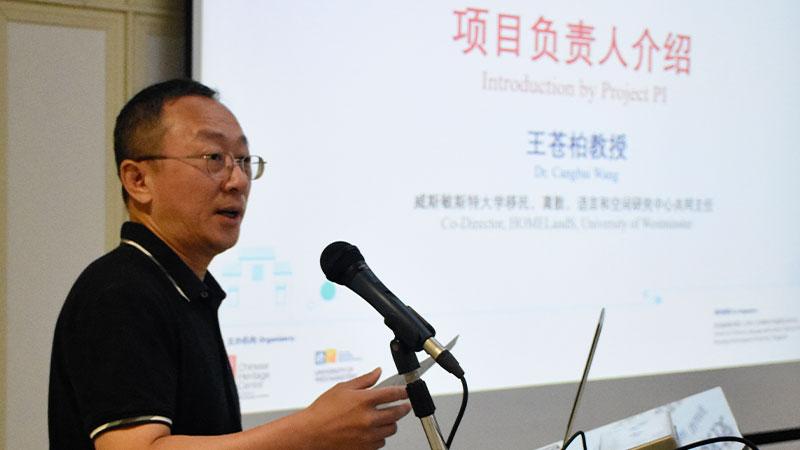On 26 July the University of Westminster’s Hub on Migration, Exile, Languages and Space (HOMELandS) Research Centre collaborated with the Chinese Heritage Centre of the Nanyang Technological University in Singapore to host the first international workshop on diasporic Chinese museums.

It brought together museum directors and curators from seven different Asian countries and Australia as well as more than 30 local museum and heritage professionals of Singapore to discuss shared experiences and explore collaborations across borders.
The workshop was held in Singapore and was organised as part of the research activities of the Global Diasporic Chinese Museums Network Initiative project funded by the Arts and Humanities Research Council (AHRC). The project is led by Professor Cangbai Wang, Co-Director of HOMELandS, in collaboration with Dr Yow Cheun Hoe and Dr Huimei Zhang from the Chinese Heritage Centre of the Nanyang Technological University (NTU) of Singapore.
The workshop was built upon the successful year-long bilingual (English and Chinese) online public talk series on diasporic Chinese museums that provided for the first time a digital platform for representatives of diasporic Chinese museums around the world to share the history and museum practices of their institutes with a global audience. The purpose of holding this in-person workshop was to create an opportunity for participating museums in Asia to have face-to-face and in-depth discussions around the key issues emerging from the online public talk series, share good practices and explore the possibility of developing collaboration in curation, exhibition and education in the future.
The workshop was opened by Dr Yow Cheun Hoe, Director of the Chinese Heritage Centre, who introduced the role of the Chinese Heritage Centre in enhancing public understanding of the history and culture of Chinese diasporas in Southeast Asia and worldwide. Professor Hong Liu, Tan Lark Sye Chair Professor in Chinese Language and Culture and Associate Vice President (International) of NTU, delivered the welcome speech. He commended the value of this AHRC project on diasporic Chinese museums, emphasised the importance of the museum in the representations and construction of cultural identities among the Chinese diasporas, and the potential of museum studies in advancing research into migration, history and society.
Professor Wang introduced the objectives and the development of the project on behalf of the team. He highlighted the urgency of developing multi-sited research methods and a comparative perspective to museums and heritage that enable researchers and practitioners to go beyond the narrow nation-state framework to examine and compare the complex ways in which the histories of Chinese diasporas are remembered and forgotten, exhibited and used in a global context, recognising a plurality of perspectives and worldviews. The project aims to fill this gap by bringing together museum curators, scholars, policymakers and other stakeholders to exchange ideas and experiences in this emerging field.

The workshop was made up of two sections. The first saw speakers discuss a wide range of issues with key focuses on common themes or interests across different institutes in the region, including museum objects, museum narratives, new technology, education, public engagement and interactions with the museum practices of diverse ethnic and migrant communities.
The second section consisted of two focus group discussions. The first one was chaired by Professor Wang, focusing on good practices, shared opportunities and challenges. The second was chaired by Yow Cheun Hoe and explored exchange and collaboration between museums across borders. Participants engaged in an in-depth discussion of how to develop innovative collaboration in collecting, curating, exhibition and public engagement, and discussed strategies to deal with various challenges faced by diasporic Chinese museums.
Participants were also invited to visit the Chinese More Or Less: An Exhibition on Overseas Chinese Identity, hosted by the Chinese Heritage Centre, and the National Gallery Singapore. The visits provided international speakers with the opportunity to interact with local museum professionals and continue the conversation on diasporic Chinese museums in local museum settings.
Speaking about the workshop, Professor Hong Liu said: “I would like to congratulate Professor Wang and the team for organising this ground-breaking event that not only benefits the development of museums on Chinese diasporas but also contributes to the development of impactful and interdisciplinary research into migration, museums and heritage in the Chinese context and beyond. I would also like to thank the support of AHRC for this much-needed project and the international cooperation between the University of Westminster and the Nanyang Technological University of Singapore which is essential for the success of this project.”
Iwan Mahatirta Lie, Director of Museum Hakka Indonesia, said: “Congratulates on the success of this workshop which is the result of thoughtful planning and excellent execution of the research team and organisers.”
Dr Jiang Haibo from the Kobe Overseas Chinese History Museum added: “Thanks for the hard work going into organising this wonderful workshop that made it possible for us to meet in beautiful Singapore. Looking forward to further cooperations.”
The workshop held in Singapore is the first in-person workshop of the project with a regional focus on museums in Asia. The second workshop will be held by the University of Westminster in London in October 2024, focusing on museums related to the Chinese diaspora and other migrant communities in the UK, Europe and North America.
This event was organised in line with the University’s research and knowledge exchange strategies which is driven by a mission to champion cultural and linguistic diversities, social inclusion, equity and wellbeing. It helps enhance the University of Westminster’s global engagement and directly contributes to United Nations Sustainable Development Goals (SDG) 10: Reduce Inequalities within and among countries and 16: Peace, Justice and Strong Institutions.
Visit the Global Diasporic Chinese Museums Network Initiative for the past and upcoming activities of the project and find out more about research undertaken by the HOMELandS Centre at the University of Westminster.


